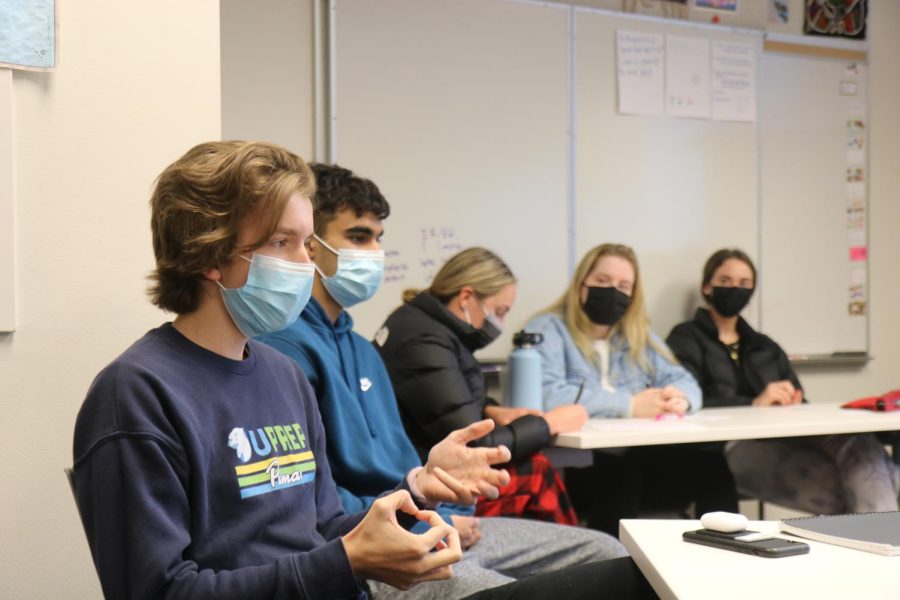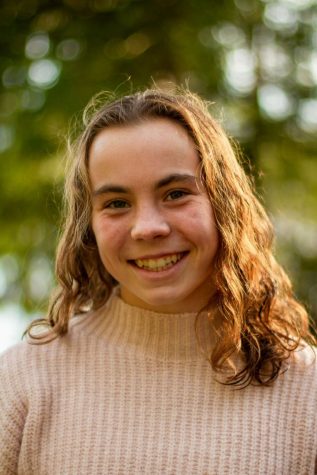LEAD-ing the Way
Students revamp Community Conversations
Photo: Abby Headstrom
Senior Zander Rasmussen talks during a LEAD conversation about political correctness in November.
University Prep students have participated in three LEAD conversations this year, leaving them wondering how it differs from the previous Community Conversations program.
In the Upper School, LEAD is a program aiming to engage students in difficult conversations.
“In an increasingly divisive society, there are very few spaces where students can come together and practice listening and responding to each other in authentic ways,” English teacher and LEAD’s faculty advisor Angie Yuan said. “The student LEADers learn how to facilitate and be present in a discussion without overpowering it— a lifelong skill.”
 In addition to helping the student facilitators practice leadership skills, LEAD seeks to give students a place to practice engaging in difficult conversations and build authentic communication skills.
In addition to helping the student facilitators practice leadership skills, LEAD seeks to give students a place to practice engaging in difficult conversations and build authentic communication skills.
Yuan, juniors Julia Cappio and Max Rubenstein and seniors Parisa Harvey and Hermona Hadush comprise the executive team. Over the summer, the four executives decided to change the previous Community Conversations to LEAD.
“We decided to rebrand this year because Community Conversations and Facilitators had a bit of a bad rep,” junior and LEAD executive Julia Cappio said. “So we decided to reinvent ourselves as LEAD.”
According to Yuan, Facilitators is the previous name for the students who lead the conversations.
Senior Mattias Keaunui had been a facilitator for two years and believes that last year’s Community Conversations and this year’s LEAD conversations are largely similar, especially the cadence of the meetings throughout the year and the topics of conversation. He does see a difference, however, in the way the current LEADers run conversations.
“I feel like [LEAD] is a bit less structured,” Keaunui said. “We try to engage the students more this time.”
Cappio agrees that this year’s structure tries to focus more on participation.
“We’re hoping that LEAD conversations can center a little bit more around student experiences than Community Conversations did. We’re really trying to make sure that our community is able to engage in hard conversations,” Cappio said. “I think that that’s something that Community Conversations in the past lacked a little bit.
According to Yuan, the executive team decided to change the role of the faculty supervisor in the room from a co-facilitator to an active participant. She acknowledged that different peer facilitators have different levels of experience and comfort level leading the conversations.
“We have some more experienced LEADers than others and so the dynamic in each room is different,” Yuan said. “It is going to be inevitable that some conversations simply go better than others. But that’s ok. We are practicing and there will be progress.”
Despite their best efforts to increase student participation, both Keaunui and Cappio still find it difficult to engage students in the conversations.
“I would say student enthusiasm [lacks],” Keaunui said. “I’m leading the juniors and it seems like a lot of them are not very enthusiastic to be there.”
Cappio noted that the LEAD executives have been reflecting on this issue and the importance of their work.
“We know that some students decide to engage in these conversations more than others,” Cappio said. “But as students, we know that there are conversations happening all the time [within the community]. And students wish that we had more tough conversations within the UPrep community and really talked about hard topics in a productive way.”
The executives hope to bring many different identities into LEAD conversations.
“We’re hoping to partner with more affinity groups like we did last year with the Queer Student Union,” Cappio said. “We just want to continue to have conversations that revolve around identity and what that identity means to the community.”
Cappio also hopes students will fully buy into these topics and actively engage in the conversations.
“I hope that students really engage in the conversations,” Cappio said. “We’re really open to constructive criticism if any students want or have ideas in order to make the program better, but the program can’t be anything without involvement from students.”



